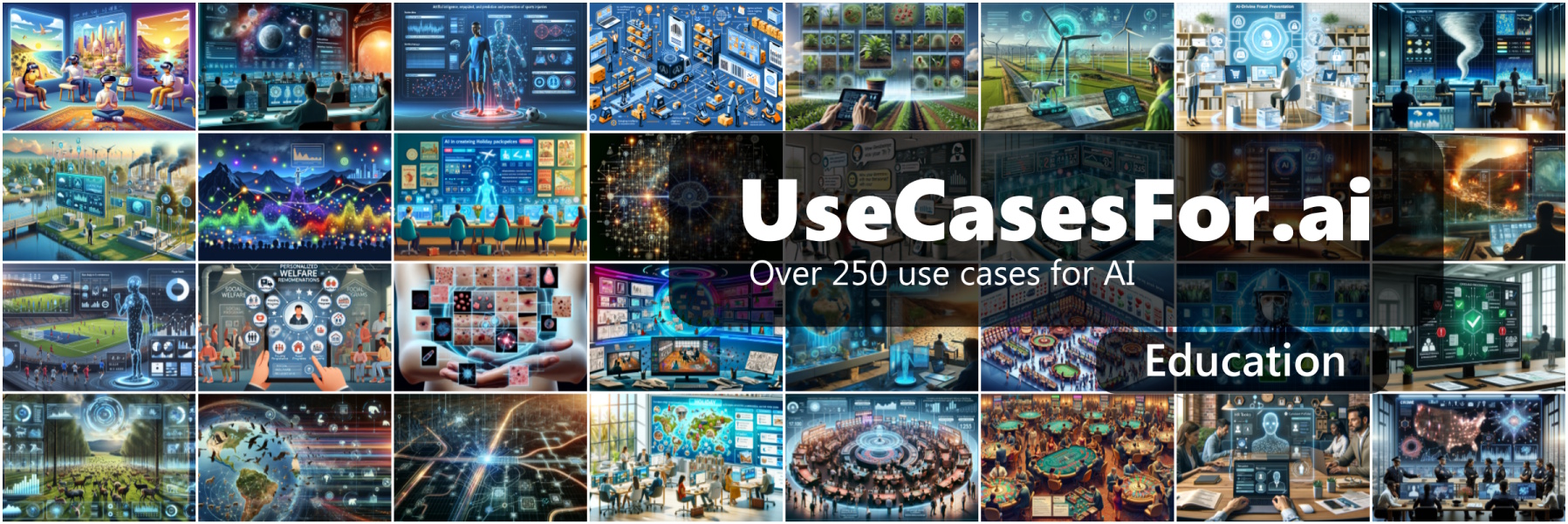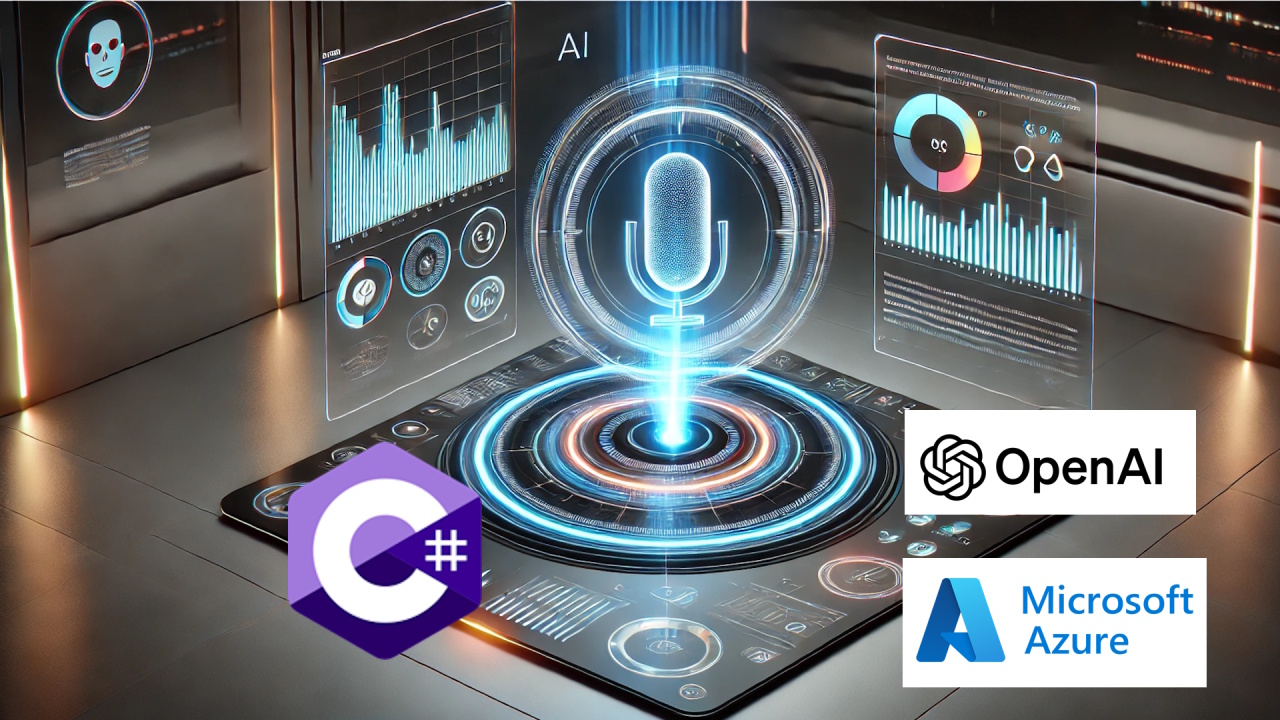I want to explore how AI is affecting a particular sector or industry every month. This month, we’ll explore use cases for AI in the education sector a little deeper.
AI in Education
Nowadays, there seems to be an arms race for education, with governments determined to educate their children better than other nations.
So, how can AI be used in education and learning scenarios? We’ll examine several use cases for AI in the education sector that use different AI technologies, from primary schools to universities and in subjects ranging from mathematics to languages.
AI has the potential to revolutionise education, offering benefits such as personalised learning, improved student engagement, and more efficient administrative tasks. However, it's important to remember that AI is a tool, not a replacement for human educators. Educators will still play a crucial role in guiding and supporting students in this AI-driven education system.
Check out UseCasesFor.ai for a list of over 250 AI use cases across dozens of sectors using different AI technologies.
Grading multiple-choice papers
OCR (Optical Character Recognition), a type of computer vision AI, can scan and mark multiple-choice documents by comparing the selected choices with the correct answers.
It examines the answers' locations and determines which students have multiple choices.
Today, No More Marking and Gradescope are already utilising OCR and AI to mark multiple-choice assessments automatically.
Takeaway: If you have many forms with a standard format, you could use OCR to read and process the completed document much faster than human markers. This saves time and relieves educators from the burden of manual grading, allowing them to focus on more important aspects of teaching.
Identifying plagiarism
Computers, powered by AI, excel at identifying instances of work submitted by students containing content copied from other sources. This empowers educators to maintain academic integrity, as they can use AI tools to find instances of plagiarism in submitted work, thereby ensuring the quality and originality of student work.
Grammarly has a free plagiarism checker that can “detect plagiarism from billions of web pages and databases”.
Personalising messages to students
Personalising messages to students using AI can significantly enhance the learning experience. By leveraging AI-powered tools, educators can tailor communications to address individual student needs and preferences. Whether offering personalised feedback, recommending supplementary learning materials, or providing targeted advice, AI enables instructors to engage with students more personally. This approach can boost student motivation and help create a supportive and adaptive learning environment. As a result, students are more likely to feel valued and understood, leading to improved academic performance and a deeper understanding of the subject matter.
Voice assistant for students
Voice assistants for students can significantly enhance the learning experience by providing an interactive and accessible way to access information. These assistants can assist students in answering questions, providing explanations, and offering study tips, all through natural language interactions. By incorporating voice assistants into the educational environment, students can receive immediate support and guidance, promoting independent learning and critical thinking skills. Additionally, voice assistants can cater to different learning styles, making education more inclusive and engaging for all students.
Produce lesson plans and content
AI technology can be used to assist educators in producing lesson plans and content. By analysing vast amounts of educational materials and student data, AI can help identify the most effective teaching strategies and create personalised lesson plans tailored to the specific needs of students. Additionally, AI-powered content generation tools can assist in creating educational materials such as worksheets, presentations, and interactive learning modules, saving educators valuable time and ensuring that the content is engaging and effective. This use of AI in producing lesson plans and content has the potential to streamline the curriculum development process and enhance the overall quality of education.
Produce revision material
Using AI to generate revision material has revolutionised how students prepare for exams. AI-powered tools can efficiently and accurately create summaries, flashcards, quizzes, and other study materials from vast educational content. This saves students time and ensures the material is comprehensive and tailored to their learning needs. By leveraging AI to produce revision material, students can benefit from personalised study resources that enhance their understanding and retention of the subject matter. Furthermore, AI-generated revision material allows students to focus on application and critical thinking rather than spending excessive time on basic review, thereby improving their learning outcomes.
Tailoring content to students
AI is crucial in tailoring educational content to meet students' specific needs. AI-powered systems can deliver personalised educational materials and resources by analysing individual student data and learning patterns. Whether it's adapting the pace of learning, providing additional explanations on challenging topics, or offering supplementary materials, AI can cater to each student's unique requirements. This tailored approach enhances learning experiences and fosters a deeper understanding of the subject matter, leading to improved academic performance.
Translation to help non-native-speaking students
AI can significantly assist non-native-speaking students through language translation. By leveraging AI-powered translation tools, educational institutions can provide non-native-speaking students with content that is accessible and understandable. These tools can swiftly translate textbooks, lectures, and other educational materials into the students' native languages, thus enabling them to comprehend the subject matter more effectively. Furthermore, AI-powered translation can support communication between non-native-speaking students and educators, facilitating a more inclusive learning environment. This approach enhances the educational experience for non-native-speaking students and promotes diversity and cross-cultural understanding within academic settings.
Research assistant
AI research assistants in education play a crucial role in modern learning environments. These assistants leverage artificial intelligence to support educators and students in various ways. For educators, AI research assistants help develop personalised learning plans and provide valuable insights through data analysis. As for students, AI research assistants offer additional support by giving explanations, feedback, and customised learning experiences. By harnessing the power of AI, these research assistants contribute to creating more engaging and effective educational experiences for all involved.
Personalised tutoring
Personalised AI tutoring has revolutionised how students learn and receive academic support. With AI-powered tutoring, students can receive tailored lesson plans and feedback based on their learning styles, pace, and areas of improvement. By leveraging advanced algorithms, AI tutors can analyse vast data to identify each student's strengths and weaknesses, allowing for a more focused and practical learning experience. This approach not only provides students with personalised support but also helps educators better understand the specific needs of each student, leading to improved academic outcomes. Overall, personalised tutoring using AI is shaping the future of education by providing adaptive and targeted support to students in a way that was impossible before.
Discover over 250 use cases for AI
If you are interested in learning about the many ways AI has been used across a variety of industries, visit usecasesfor.ai
Want to know how AI can help your business?
If you are wondering how AI can help your business and how to develop or maintain your competitive advantage by adopting the latest innovations in AI, please reach out to us at Userware.dev
-- Lee















